 By a single vote, President Andrew Johnson avoided impeachment by Congress.
By a single vote, President Andrew Johnson avoided impeachment by Congress.
As the seventh of seven Republican Senators, Edmund Ross of Kansas proved to be the person whose decision would either convict or acquit the beleaguered Johnson of “high crimes and misdemeanors.” Ross’s vote turned out to be the one vote necessary for a required two-thirds’ majority to convict. However, rather than go along with his party, Ross chose to act on his conscience.
While Ross was known to personally dislike Johnson, the question of why was not answered until years later by Ross himself:
“In a large sense, the independence of the executive office as a coordinate branch of the government was on trial… If the President must step down… a disgraced man and a political outcast… upon insufficient proofs and from partisan considerations, the office of President would be degraded, cease to be a coordinate branch of the government, and ever after subordinated to the legislative will. It would practically have revolutionized our splendid political fabric into a partisan Congressional autocracy… This government had never faced so insidious a danger… control by the worst element of American politics… If Andrew Johnson were acquitted by a nonpartisan vote… America would pass the danger point of partisan rule and that intolerance which so often characterizes the sway of great majorities and makes them dangerous.”
In Profiles in Courage, John F. Kennedy wrote, “His one heroic deed has been all but forgotten. But who might Edmund G. Ross have been? That is the question – for Ross, a man with an excellent command of words, an excellent background for politics and an excellent future in the Senate, might well have outstripped his colleagues in prestige and power throughout a long Senate career. Instead, he chose to throw all of this away for one act of conscience.”
Considered a political traitor to his party and disliked by his own constituents, Ross was gone from the Senate and public office two years later.
Comments










